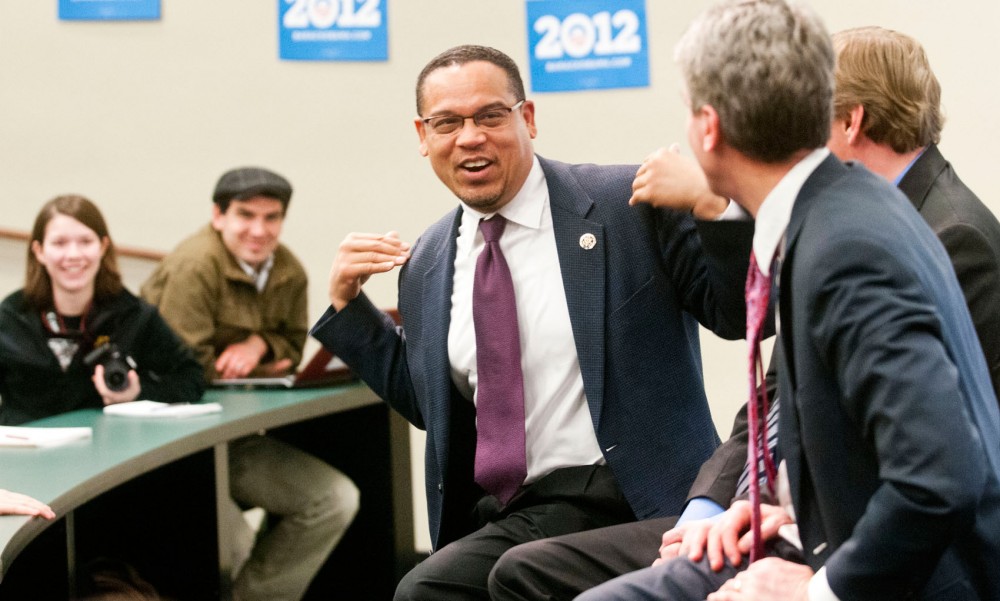In the corner of a modest brick building in north Minneapolis, U.S. Rep. Keith Ellison’s office is quiet.
Coffee is calmly sipped, conversations are discreet and aides keep a steady pace.
But once Ellison enters, the office is energized. Constituents laugh, printers roar and business cards fly.
In his second term as representative for Minnesota’s 5th Congressional District, which includes the city of Minneapolis, Ellison said he tries to bring this energy to everything he does, including on campus.
“We take the student vote very seriously and go after it aggressively,” said Ellison, who was the first Muslim elected to Congress and the first African-American to represent Minnesota.
Since being elected to Congress in 2006, Ellison has supported legislation that reduces interest rates on student loans, increases funding for Pell Grants and makes higher education more accessible to low–income citizens and people of color.
Despite his efforts, student awareness of Ellison remains low. In an informal Minnesota Daily survey of 50 University students on campus, just seven said they knew who Ellison was.
Still, Ellison, who is up for re-election in November, said student concerns will remain a high priority for his office.
“My campaign is dedicated to cultivating the student vote,” Ellison said. “And not just in election time, but year-round.”
Finding Politics
Raised Catholic in Detroit, Ellison developed a harsh cynicism for politics after he blamed local politicians for the decay of the city.
Ellison studied economics at Wayne State University, where he converted to Islam when he was 19.
Unsure of what to do with a degree in economics, Ellison enrolled at the University of Minnesota Law School. While attending law school, he started to get more involved with political activism but remained skeptical of politics.
“I didn’t see that many images of electoral politics really delivering for people,” Ellison said.
By his late 20s, Ellison was the director of the Legal Rights Center and made frequent trips to the state Capitol. During that time, he got to know the late Sen. Paul Wellstone, who got him interested in politics.
“I believe [Wellstone] was a great man and one of the things he did for me was help me see that you could be immersed in electoral politics and not compromise who you are and what you’re about,” he said.
Straightening a path
Ellison served two terms in the Minnesota State Legislature before the Democratic-Farmer-Labor Party endorsed him for the 5th Congressional District seat.
In the left-leaning district, an endorsement from the DFL should’ve secured the seat for Ellison. But claims that he associated with the allegedly anti-Semitic organization Nation of Islam, and its leader Louis Farrakhan, hurt his campaign.
Ellison’s Republican opponent at the time, Alan Fine, said he brought up the Nation of Islam issue because he believed Ellison was more dedicated to serving national factions than the district.
“I didn’t feel like he was running to represent the people of the 5th District. I felt like he was running to represent his particular national niche,” Fine said.
While the episode illustrated the political challenges of being a Muslim politician in a post-9/11 world, he has been a role model for some students.
Last year, Ellison gave a tearful testimony to a congressional committee investigating Islamic radicalization. Ellison defended the memory of Mohammed Salman Hamdani, a Muslim paramedic killed in the Sept. 11 attacks.
“His life should not be identified as just a member of an ethnic group or just a member of a religion but as an American who gave everything for his fellow Americans,” Ellison told the committee.
Omara Anjum, a senior in the Muslim Students Association, said Ellison demonstrates the true nature of Islam compared to what is shown in mainstream media and provides courage to his Muslim constituents.
“Because of Ellison some [Muslims] aren’t scared to show that they’re Muslim and they’re Americans at the same time,” she said.
Representing the U
At his desk, Ellison struggles to sit still. He devours a pack of gum, rolls in his chair and taps his feet as he talks about the rising costs of higher education.
“It’s a statewide disgrace,” he said in response to hearing that in-state tuition at the University increased 152 percent between 2000 and 2010.
“I’m a long-term supporter of the U but that doesn’t mean that I need to agree with everything they do,” Ellison said.
While Ellison has been a strong supporter of improving federal funding for higher education, he has disagreed with the administration on several issues.
He opposed building TCF Bank Stadium because it raised fees for students. He also opposed the University dismantling the General College in 2006.
“The University is becoming an elitist school,” he said. “If it’s a land-grant university dedicated to the education of the people of Minnesota, it should be reaching out, not excluding more people.”
Ryan Lyk, chairman of the statewide College Republicans and a junior at the University, said the work Ellison is doing is actually counterproductive to helping students.
“He tends to favor a lot of legislation that isn’t pro-job creation,” Lyk said. “If there aren’t jobs available, the last four years is kind of for nothing.”
But Ellison said he’s working to represent students in Congress to increase higher education opportunities for more students.
“[A] better society is where more people have access to higher education and not fewer,” he said.







